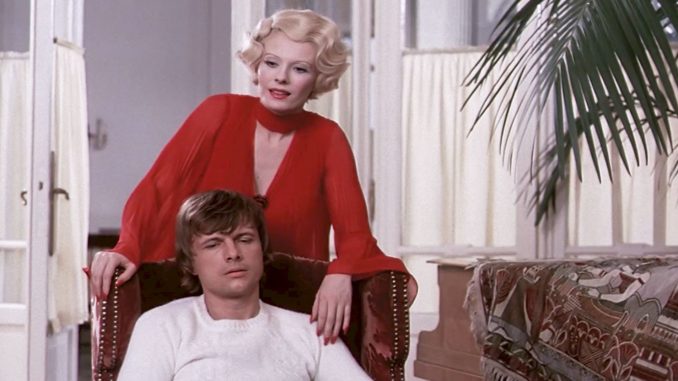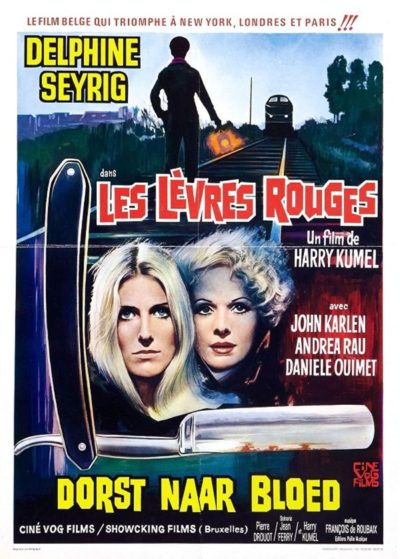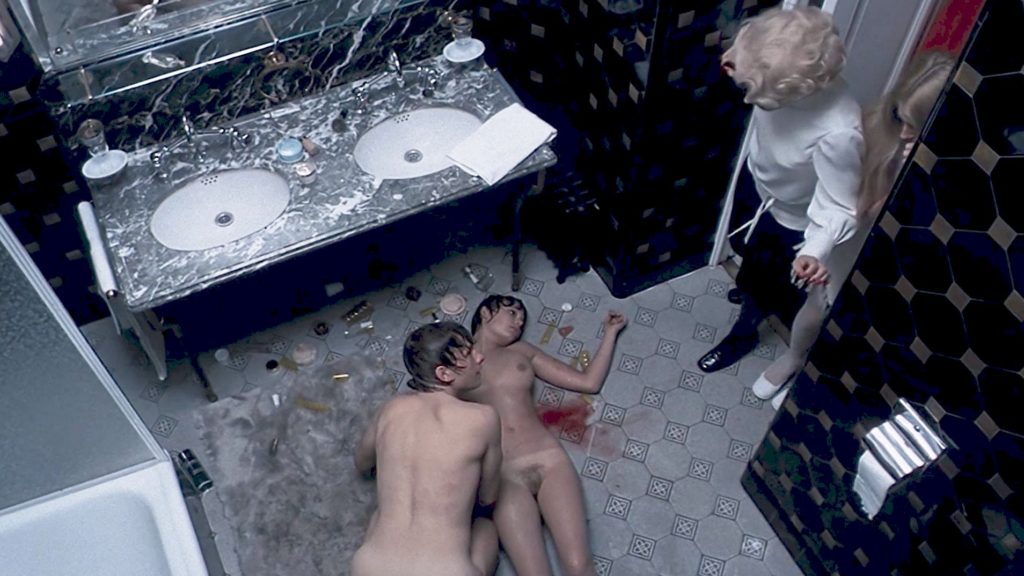
Rating: A-
Dir: Harry Kumel
Starring: Delphine Seyrig, John Karlan, Danielle Quimot, Andrea Rau
“I’m not afraid of you.”
“Oh, yes, little edelweiss. You are afraid of me. You’re terrified…”
It was somewhat amusing to see Seyrig suddenly go mainstream, more than thirty years after her death. Her film, Jeanne Dielman, 23, quai du Commerce, 1080 Bruxelles, came out of nowhere to be pronounced the greatest film of all time, by Sight and Sound magazine’s 2022 poll of over 1,600 critics. Not everyone was impressed, e.g. Paul Schrader calling it “a landmark of distorted woke reappraisal.” I haven’t seen Jeanne, and probably won’t: 201 minutes of largely undiluted housewifery doesn’t seem like my thing. But it was nice to see its star acknowledged, because I would say her performance in Daughters of Darkness is one of the best ever, not only in a vampire movie, but any horror film.
She plays Countess Elizabeth Báthory, who arrives in a nearly-deserted Ostend hotel, on the Belgian sea-front, along with her companion, Ilona (Rau). The only other guests are a recently married couple, Stefan Chilton (Karlan) and his Swiss wife Valerie (Oulmet). They were on the way back to England to meet his “mother” – quotes used advisedly, as we’ll see – but a train delay caused them to miss their boat. They initially plan to be in the hotel only briefly, but the hypnotic effect of the Countess on both husband and wife causes their stay to be extended. Báthory’s fascination with Valerie is much to the disgust of Ilona, who sees a challenge to her position. Stefan, too, eventually comes to realize the threat the Countess poses to his marriage.
 You’ll have noticed the complete absence of the “v” word from the above paragraph, which sounds more like a genteel social drama. This is very understated in terms of actual vampirism, with only one instance of blood drinking that I recall. It’s all insinuated: there’s a string of recent murders in nearby Bruges, with the victims being young women who had their throats torn out, without any blood to be found. Stefan and Valerie bump into the scene of one such crime on a day-trip, which clearly fascinates Stefan, as much as it repels Valerie. Me, I just appreciated the unexpected opportunity to drop some choice quotes, e.g. “If I grew up on a farm, and was retarded, Bruges might impress me. But I didn’t, so it doesn’t.”
You’ll have noticed the complete absence of the “v” word from the above paragraph, which sounds more like a genteel social drama. This is very understated in terms of actual vampirism, with only one instance of blood drinking that I recall. It’s all insinuated: there’s a string of recent murders in nearby Bruges, with the victims being young women who had their throats torn out, without any blood to be found. Stefan and Valerie bump into the scene of one such crime on a day-trip, which clearly fascinates Stefan, as much as it repels Valerie. Me, I just appreciated the unexpected opportunity to drop some choice quotes, e.g. “If I grew up on a farm, and was retarded, Bruges might impress me. But I didn’t, so it doesn’t.”
The other aspect which point to vampirism is the Countess’s unchanging appearance. The concierge in the hotel recognizes her from 40 years previously, when he was just a young bell-hop. She suggests it may have been her mother – but then, quite deliberately calls him “Pierre”, even though there’s no way she should have known that. The film seems to imply she’s not a descendant of the notorious Countess Báthory, but the immortal woman herself, who escaped after being walled up in her castle for her crimes. She’s now roaming Europe, with her rather unwilling companion, moving on every few days to avoid detection. Yet there’s a former detective, who also remembers her previous visit to Belgium, and the Countess is also seeking to swap out Ilona for a blonder model.
It’s easy to understand the hypnotic power she has, Seyrig managing to make even a white polo-neck sweater look like the height of fashion. Nobody can stand against her, no matter how they feel about her, as the quote at the top suggests. The Countess speaks as if she wants to liberate Valerie from Stefan’s control, yet as Ilona’s wretched condition shows, Valerie would just be exchanging a master for a mistress. Bathory is hardly the heroine here. There are clear parallels between the Countess/Ilona relationship, and that of Stefan and his “mother” – who, it turns out, is actually an effeminate man (played by Dutch film-maker Fons Rademaker, who won an Oscar for The Assault). It is just a master/servant situation? Or might there be more at play there too? The film decides not to discuss the situation in any depth.
This is quite beautifully shot, with an entirely appropriate soundtrack and makes great use of its locations. The exteriors are of the Grand Hotel des Thermes, on the sea-front in Ostend, while the interiors were shot at the Hotel Astoria in Brussels, with its fabulous staircase. I now want to stay in both establishments, although the latter is currently being redeveloped: the work should almost be finished. The entire film just oozes sensuality. While there’s no shortage of nudity, mostly from Rau and Quimot, perhaps the peak is Stefan and the Countess detailing the exploits of her “ancestor” (top): “Their white bodies pumped out young blood over her naked skin…” It’s perhaps a rare exception to the rule that, in cinema, it’s better to show than to tell.
This review is part of our October 2023 feature, 31 Days of Vampires.

[Original review] There’s an unhurried calm about this movie – it doesn’t feel the need to rush around in a Hollywood-style frenzy, things just gradually develop. The pace may thus seem sluggish to those used to Blade-like antics, but I like the languid grace. Newly-married but odd couple Stefan and Valerie (Quimot and Karlan – the latter would go on to Cagney and Lacey, as Mr. Lacey) find themselves sharing a Belgian seafront hotel in the middle of winter, with the Countess Bathory and her “secretary”, while in a nearby town, various blood-sucked corpses are appearing.
Seyrig is fabulous as the Countess; possibly the finest female vampire ever, and she’s also the most well-adjusted and pleasant personality in the film. The four characters thrash around, switching partners and you just know it’s all going to end in death. Lots of death. One interesting subplot is whether Karlan’s character is also a vampire: his reaction to blood is odd, he too has a same-sex “mother” lurking in the shadows, and the necessary sadistic streak is certainly present. It’s another nice sidelight, to a spooky, atmospheric and effective film which has just the right mix of terror and eroticism.
